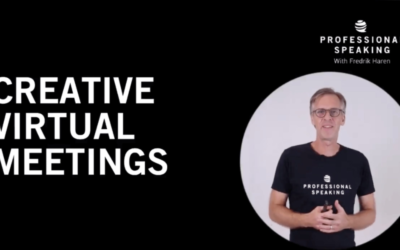
Corporate leaders are often required to give talks and speeches as part of their job. The problem is that many of them dislike it, some loath it, and very few are actually really good at it.
Don’t get me wrong, there are some great speakers within the world of corporate leaders, but the truth is there is also a huge amount of not so great speakers within the ranks of leaders; leaders who still are forced to speak.
As a professional speaker for 20 years I have spoken at more than 2000 conferences and at almost all of those speaking assignments I have had to listen to an amateur speaker speak.
It could be the HR Director, the CEO or the CMO etc.
Many times it is informative, often its inspiring, yet after hearing literally thousands of amateurs speak I have put together a list of the most common mistakes that leaders do when giving a speech. Mistakes that could easily be corrected to deliver a speech with much better impact.
Here are my top 5 most common mistakes that leaders do when they give a speech:
5) No message
Perhaps the biggest mistake corporate speakers do is that they use a lot of words and waste a lot of minutes to deliver their speech, but if you ask a person in the audience after the speech: “What was the core message the speaker wanted to communicate?” they are not able to answer.
The reason is most often that the speaker himself (It is most often a “he”) could not answer the question “What is the main message of your speech?”
Advice: Before you make all those slides think about why you are giving this speech to begin with.
Where are we now as a group?
What are the challenges that this group is or will be facing?
What would happen if those challenges are overcome?
What do you/they need to do to overcome them?
4) Not prepared
I am amazed how many times I hear a CEO go up on stage and say: “As I was going to work this morning I was thinking about what I was going to say today…” It is like they are proud of not being prepared.
The result is often a long, incoherent, stream of words with very little impact on the audience.
Advice: As a leader there are a million things you need to juggle in your head, I get that. But if you do a first draft of your speech the minute someone (or yourself) give you the assignment to speak at a conference, then your subconscious part of your brain will work on the speech until the day of the conference.
3) Not Personal Enough
Many leaders outsource the writing of their speeches to some assistant or some speech writer. I think that is a terrible idea. You might as well outsource your whole leadership role then. When you speak as a leader it might just be one of the very few times that some of the staff get to listen to you for a full 30-minutes (or 45 or 1 hour) without interruption.
Advice: Bring in speech coaches, speech writers and have people help you with your speech, but make sure it is your speech. Infuse it with your own stories, your own messages, your own ideas. And use your own words.
2) Too Much Information
Some leaders seem to think that the more data, information, numbers, graphs and words they can fit into a presentation the better it is. The fact, of course, is that the opposite is true.
I think the people who overload their presentations with too much information do that as an “insurance” so that they later can say; “but I told them that in my presentation”. The problem is that a speech is not measured on what you tell an audience – but on what an audience remembers.
And information over-load means very little tend to stick.
Advice: Write down three things that the audience should be (mentally) writing down when hearing your speech.
Remembering three main points in a speech is much better than not remembering 40 slides of information.
1) Uninspiring
Some leaders seem to almost scoff at the idea of “being inspiring”. But inspiration is “the process of being mentally stimulated to do or feel something, especially to do something creative.” To miss out on an opportunity to mentally stimulate the staff to want to do, or feel, something is such a wasted opportunity.
So how do you inspire with a speech? By giving the feeling that the message means something to the speaker, that something is at stake and that we need to come together to fix it.
So there you have it: Five of the biggest sins of corporate speakers.
Do not get me wrong: I am not expecting leaders to be professional speakers. I am expecting them to be professional leaders, and part of being a professional leader is to be able to give a speech that inspires the staff.
When I have the pleasure of listening to leader giving a great speech I get reminded of the power of a speech as a leadership tool. Done right few things are more effective in getting a group of people to move in a certain direction than a well crafted speech.
Today I was invited to a “Nobel Dinner” hosted by the Swedish Embassy in Hanoi where the Swedish ambassador had invited the most prominent and important people in their network to come and mingle and network with the embassy staff.
I was invited to give a short dinner speech about Sweden as a creative country.
During the dinner the embassador also held a speech about Sweden as a creative country. It was a light hearted, relaxed and focused speech that communicated the idea of Sweden as a creative country. But what really impressed me happened later during the dinner. As the dessert was being served the embassador stepped up again and proclaimed that he was going to be part of the dinner entertainment, and then he started to sing (!).
An embassador speaking about his country as being creative is one thing – but to actually do a creative and unexpected thing (in this case singing) during a dinner communicated the image of Sweden as relaxed, creative and spontaneous much more than any words could have done.
Inspired by “the singing embassador” I walked back to my hotel in the wonderful Hanoi night. I wish that would happen more often. Perhaps this short post can help make the average speech of the boss a little bit better.




